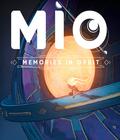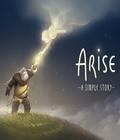Each chapter represents a specific turning point in a man’s long life filled with relatable moments of joy and sorrow. Arise’s heartwarming love story will have players experience diverse powerful emotions – both the protagonist’s and their own.
Your journey begins, as our protagonist’s life ends, in limbo. Relive crucial events of his life as you make your way towards the mesmerizing light beckoning from a mountaintop, using your newfound gift of time manipulation to help you overcome many obstacles along the way.
WorthPlaying: Arise is your first game. What made you decide to make it without text and no spoken words? You just have music and images. Was that a challenge?
Alexis Corominas: Exactly. Because it was a challenge. Because it is the kind of adventure that we like the most.
WP: What was the main idea behind Arise? What are you trying to convey with the game?
AC: The main goal is to touch people. To make them feel something through gameplay, and through the story, through the visuals, and the music. Beyond that, obviously we want them to have fun while they are emotionally connecting with the game.
WP: How did you balance the different elements in the game? You have a focus on gameplay, art, and music, but no text, and no spoken words. How do you make it all work together?
AC: Well you balance it by working a lot, and iterating a lot, and trying a lot of things that don't work. At the end, by natural selection, the ones that work are in the game.
WP: Can you tell us something that didn't work for the game? An idea that you tried and you had to throw out?
AC: Sure I will give you two ideas that we tried. One of them is that we tried to have the snails where you could remove the shells and then put the shell of a snail in another shell, but it became like a very complex puzzle, and it didn't fit, it didn’t match the overall feeling of joyfulness of level 2. Another idea that we tried is geysers that suddenly sprout out of the Earth and project you into the air, and this didn’t work.
WP: Was time always a key element of play when you started working on Arise or did manipulating time as a core game mechanic come in somewhere midway through the development process?
AC: It came naturally, but not just at the beginning. We had the story. We had most of the elements but we ourselves were saying, “We are missing something. We are missing some x-factor in the game.” Then we started to think about what we could do and we came up with the idea of manipulating time.
WP: Tell us a little bit about the cooperative mode. It's not a traditional two-player mode in the sense that you’re each controlling an individual player. You're actually splitting up the movement and time controls between players.
AC: Yes, because what we want is both players to feel engaged and to feel that they are together overcoming challenges. Because that's what life is, and that's what the game is about.
WP: What about the music? How did you end up choosing David García as your composer?
AC: We chose him because he had worked on Rime. He already knew some of the members of the team. We knew what he was capable of and we had the same references, he and us, when we started talking about the game, which were Studio Ghibli films. So it all came quite naturally and he did great work.
WP: You mention Studio Ghibli and obviously the game visuals don't look directly like any one animated film, but they certainly look like they were inspired by animated films. Was there a particular movie, or a handful of movies, that served as a reference for you?
AC: Yes, actually Studio Ghibli films for one, but we have a more volumetric approach. Actually the game was more flat at the beginning. Then we decided to mix it with volumetric lighting and it got its own personality, which is how it looks now. The other reference, it’s Fantasia, the movie by Disney. There are levels that you haven't seen now, that will remind you of Fantasia.
WP: This is your first game. Now that you've gotten through the process, you're finally at release and looking back. Would you do it again? What was it like jumping in and just going for it?
AC: Well, deciding to do that was quite a crazy wild decision, but it was the right one because we enjoyed it a lot and I'm eager to experience it again with our next game.
WP: Anything we haven't talked about that you would like to add?
AC: Well actually Piccolo, the name Piccolo the company, means small in Italian and that's how we see our company. We don't want to be a hundred people developing. We are now 15 people; we may grow to maybe 20, 20-something, but we want to keep in a range that everyone at the company can talk to everyone without bureaucracy involved and make decisions. Great creativity, the best creativity at least from our perspective, comes from a team, not from a single person.
WP: Last question. Any tips for players that they should be on the lookout when they sit down for the first time with Arise?
AC: To explore time and enjoy the ride.
More articles about Arise: A Simple Story













 Arise is an emotional journey and a deeply moving adventure game through the life of two people where memories come alive and time bends to the player's will.
Arise is an emotional journey and a deeply moving adventure game through the life of two people where memories come alive and time bends to the player's will.